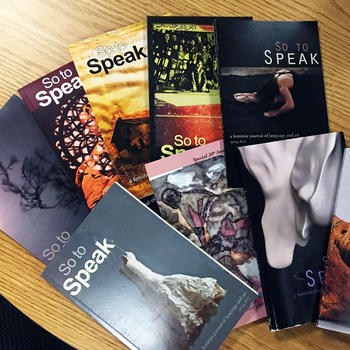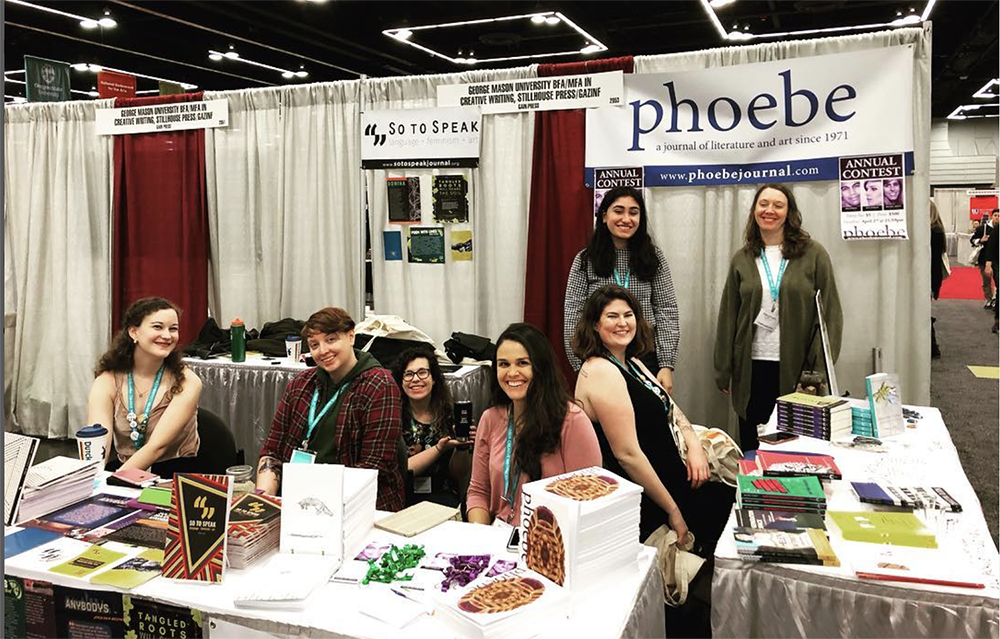Imagine: the early 1990s. Toni Morrison just won a Nobel Prize. The Soviet Union is dissolving. Amazon, an online bookstore, is about to launch on the brand-new worldwide web. And women are still, overwhelmingly, not being published.

But in 1993, a group of students in the MFA in creative writing program at George Mason plans to change that with the launch of So to Speak, a feminist journal for art and literature.
“Journals, while theoretically open to everyone, were dominated by male authors,” said Colleen Kearney Rich, MFA ‘95. “There weren’t many places for women, specifically, to be published. We wanted a seat at the table.”
Rich was one of the original editors of the journal, recruited by the cohort of poetry and fiction students who spearheaded the idea.
Back in the early days, the journal had minimal funding. “Only a thousand dollars!” Rich remembered. “All the other established journals could pay their staff. It was volunteer work for us in the beginning.”
Working on the journal at night after classes, teaching each other how to use Adobe PageMaker, filing tons of paperwork: the first issue of the journal was a true labor of love that they weren’t sure was going to be well-received.
“We were trying to figure out how we could print this thing with only $1000,” she said, “And we were worried about the pushback we’d get.”
But there was clear and obvious interest from authors outside of Mason.
“I remember when our first submissions came in. One of them was poems from Lucinda Roy, the award-winning novelist and poet. And I thought ‘Oh my gosh, this is real. People are really coming to us.’”
Even in those early days of bringing finished copies to the printers on disc drives, So to Speak was, Rich thinks, a trailblazer.
“I feel like it set the tone for the shifts we’re seeing in publishing now,” Rich said. “In the past ten years, journals have become more cognizant of diversifying the authors they publish. But that’s what So to Speak has done since the beginning. We were always ahead of the curve.”
Thirty years, more funding, and the advent of USBs and Cloud drives, So to Speak’s core mission remains the same: give underrepresented voices a seat at the table.
“Literary journals, though improving, are still overwhelming homogenous in who they publish. And many of them are currently being defunded,” said current editor-in-chief Eli Vandegrift. Vandegrift, BA English ’20, returned to Mason for their MFA in creative writing. They’ve worked on So to Speak since their first semester in the MFA program, first as the assistant poetry editor and then moving up through the ranks.
“We’re trying to showcase a wider range of voices, and we want to support writers and artists whose experiences and perspectives are not published as frequently. We want to read from as many different identities as possible,” said Vandegrift. “Giving a platform for those who have been silenced, censored, or underrepresented is what So to Speak is all about. And it’s awesome that MFA faculty and Mason continue to be supportive and invested in our work.”
So to Speak embodies their mission of bringing more voices to the table in its staff as well as its contributors. Because So to Speak is an entirely student-run publication, graduate students across the MFA’s three concentrations get the chance to experience the other side of publishing and editing: parsing through submissions, organizing content, printing and distributing each issue, and managing administrative tasks.
“It gives you a new perspective, being on the other side of the submission portal,” Vandegrift explained. “You realize that a rejection, for example, might have nothing to do with quality of your work, but is just a matter of taste. Try again in two years, when the reviewers might be different, and you could get a completely different answer. But that’s good: to evolve and change in what we’re looking for allows for more people to be seen and heard across the industry.”
Since the beginning, putting it all together has been a team effort. For both Rich and Vandegrift, cooperation and collaboration between the various editors is key to So to Speak’s success.
“My team is incredible,” Vandegrift said. “And I think that, because we work as colleagues and not as a hierarchy, it really speaks to the vision of equity that forms the foundation of the journal itself.”
Another thing both editors agree on: as long as it continues to evolve, So to Speak has a bright future ahead.
“I hope it made a difference,” Rich said. “I hope prospective students saw what we were doing—what they’re still doing—and felt that they and their art would be welcomed at Mason.”

More from Women's History Month
- March 25, 2024
- March 20, 2024
- March 18, 2024
- March 13, 2024
- March 11, 2024
